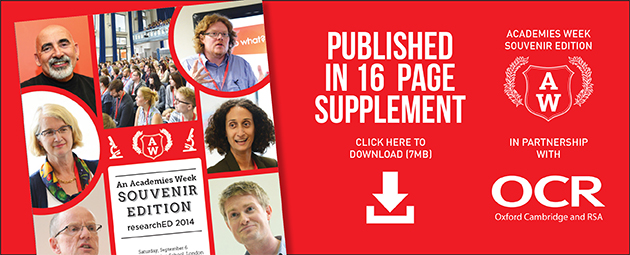The headteacher of the Huntington School in York presented a new project that introduces “Sherlock Holmes” into schools.
John Tomsett (pictured) outlined the importance of getting research into schools and into the hands of teachers. He suggested they might then change their practice for improved student outcomes.
He introduced his new project, Research-leads Improving Students Education (RISE), which aims to appoint a research-lead — “a Sherlock Holmes figure, looking deep into the evidence”- into schools as a way to put good research into the hands of teachers and into classrooms.
“If you centralise what you want to do in your school, you must change the structures to accommodate that core purpose rather than contort the core purpose to around existing structures. One of the things we’ve done is appoint a research lead. I think it will work.”
He also spoke about the importance of using experience and evidence together to produce wisdom.
Alex Quigley, also of Huntington School who is assisting Mr Tomsett with the RISE project, added: “Over the past year I have tried to base decisions more upon evidence, as imperfect as that may be . . . to make better informed judgments. Moving to what John said about wisdom . . . taking evidence and experience together.”
The RISE project will recruit 40 schools to a randomised control trial (RCT), 20 controlled who will carry on their structure in their own way, and 20 who will use a research-lead.
Research-leads will be trained over eight months, starting in January next year. Support networks will then be established to work collaboratively on how to get the best results from the project.
Excitement can be a dangerous thing in education
Interventions and issues will be identified in these schools, with a focus on English and maths, in September so that the research-leads know what they should be looking at based on the best evidence.
The first year of the core intervention will be analysed between November next year to July 2016; year two of core intervention will be July 2016 to November 2017.
However, Mr Quigley did stress that it was no quick fix. “It’s not an easy answer and we don’t pretend it to be so.”
Rob Coe, from the Centre for Evaluation and Monitoring (CEM), will assist Mr Tomsett and Mr Quigley in designing the programme, and deciding what research the research-leads need to know and the type of research skills they need.
He said: “I’m sure you can feel the buzz and enthusiasm with which we got involved with this, but excitement can be a dangerous thing in education.
“We get excited about a lot of stuff and most of it doesn’t work at all, so we need to be pretty careful. That is why we need to think carefully about what the mechanism is here.
“Our strategy should therefore be to make the best choices we can from the best evidence available, to try it out with an open mind and see if it works. If it does, we can keep doing it; if not, we will learn from that experience and try something else.”
Mr Tomsett explained how important the role of the headteacher was. “The success or otherwise of research getting into schools, into classrooms and into teachers’ hands depends upon the headteacher changing the structure of their school and making sure certain conditions are there for that to happen.
“I call this leadership wisdom. If headteachers don’t have leadership wisdom and can’t create the culture in the school for research to flourish then, you’ve got no chance of making this work.”








Your thoughts